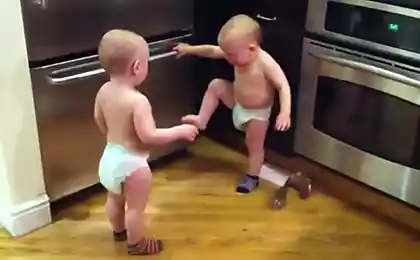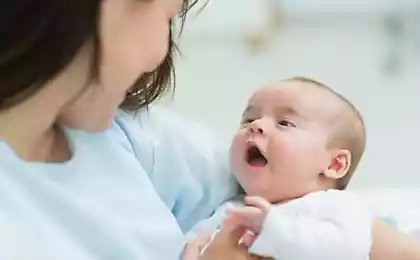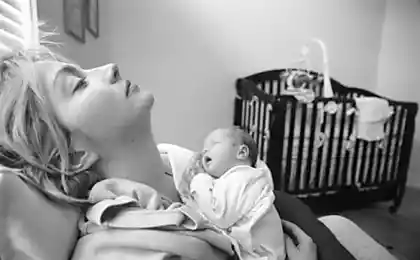528
The world through the eyes of a baby — what you need to know mom
Eighty six million six hundred seventy nine thousand five hundred seventy six
фото:amedeaucosmetics.wordpress.com
Without a reliable, strong attachment and caring child grows up mentally complete human being.
Everything that a child needs besides food and security, — a attachment, so he with the first of his days seeking to contact available means. He learns his mother much sooner than she begins to smile purposefully, thereby separating it from the environment.
Observation showed that as soon as he can, he turns his head to the sound of your voice mom, not a doctor, he tends to smell mom's milk, not other women. Very early the infant looking for an emotional response from a loved one.
President of the Austrian society for the protection of mental health of babies, Dr. Katherine Krupp says that bonding occurs immediately after childbirth, when the amount of hormones in the blood of the mother and her baby reaches its maximum. Oxytocin is released during childbirth, the hormone of cooperation and love, and endorphins affect the brain by changing the conditions of its functioning. Thus, the state of the brain, the whole body just gave birth mom and her child is exceptional, it is that they very quickly fall in love with each other.
If the first second of the mother seeing the baby, you may feel puzzled and think, "Oh, God, who is it?"— then after a minute, seeing it, she falls in love with him for life.
Unlike animals we are less fixed in their affections biologically, love may develop later, but it is noticed that for a large number of women and babies after cesarean section love and understanding develop harder.
Once the child after the first meeting already "loved" your mother, then he begins to look for her and longs, if it is not, and rejoices when she's around. Unwarranted C-section, when, for example, a woman afraid to give birth alone and asks about the operation, prevents the invisible link between child and mother, because they after childbirth continue to be one. It is important immediately after birth to provide women the opportunity to be with the baby as much as she needs.
Avoid weighing, measurements and other sick rituals soon after birth. All this time later!
Remember the feelings of surrogate mothers, prepare them for the abandonment of the child, support at the time of transfer of the child to the other mother and, most importantly, help to survive the loss of a baby.
WHEN YOU NEED HELP
The baby is constantly crying, or my mother often Wake up at night. The baby refuses to eat and suffers from underweight.
The mother psychologically "behind": child is running around, and she still says how hard it was in the first year. This "gap" can be related to any emotional trauma to the mother.
View of a cheerful baby and mother with signs of sadness or fatigue the person should alert the first family.
Mom feels that she does not like a child or like something is wrong. The child develops "avoidant" attachment: he turns away from her, not looking her in the face, not worried if she leaves.
Mom doesn't understand toddler, or it seems that he rejects it.
Our consumer society distracts a woman from the authentic needs of her child, it imposes her paintings brilliantly removed a child's room, creams, diapers and baby food, which is really the child does not need. All he needs is a quiet place next to the mother love and mother's milk.
Given birth to and breastfeeding woman for a long time is in an altered state of consciousness, she fully focused on the newborn, the rest of the world disappears for her, in this particular emotional state when it's like she ceased to exist, and her health and feelings depend on the state of the baby, it reacts to everything that touches her feelings and what she is emotionally in tune: sober remarks doctors do not always reach, but abandoned in the hearts of the phrase of nurses "I have such mothers..."may cause her depression. If the nurse said, "Well, honey, you look like you fed him well and how he likes" — that would instill confidence in a young mother and for her to become the main man in the Department.
That means "maternal instinct"? Sensitivity and caring: to receive signals of the baby, properly interpreted, respectively, and to react quickly. This heightened sensitivity leads to the fact that the woman for about six months after childbirth is very open and defenseless condition. This is a new capacity for sensitivity, which it secured in the best way contributes to the survival and development of a defenseless baby.
Mom, however, feels a lot of uncertainty as to himself: "whether I do the same? Where are my former interests, will I be able to return to them or is it gone forever?"Young mothers need a caring environment, so that this instinct could reveal, so avoid those you teach and impose.
Mothers and fathers, even inherent to instinctive wisdom and the mood on the child, but dismissed it in conditions when a woman feels her accept and appreciate.
Ask yourself what tells me a child (their behavior, emotions, facial expression)? What does he mean? Do I understand it correctly? How can I better understand my baby? A single mother is not a natural phenomenon.
Man is a gregarious creature, and the lack of "his flock" a woman is carried heavily. Exactly the same as if the mother has "his flock", but in this pack has no children, then she is a mother, a loner. In fact, for this reason, early return to work is undesirable: a mother rarely finds emotional response and support in the workplace. Yes, and going to work is unpleasant for the child up to two years, he must constantly be with her mother.
The woman to communicate well with families where there are children of different ages, including toddlers. Mom at this time, instinctively drawn to each other, and usually after 4 — 5 years they are no longer interested in each other, and many past Hobbies come back.
Often, not meeting his desired response, the child "ties" are close to the high price own functional disorders. Distortions in the sensation, feeling and thinking will be the response of the child to the parents ' inability to give him emotional comfort.
BACKGROUND
Psychologist and psychoanalyst John Bowlby was the initiator of creation of the society for the protection of mental health of infants. After four years in England, not a single orphanage, all the little children received family. He has recorded on tape and presented to the members of the Parliament changes every day happened to little two-year-old boy who is in the hospital without mom. On the film fixed that two weeks without a mother with a child irreversible changes occur: the first two days it he screams the mother, then the resistance is weakening, but at the same time appears on his face an expression of pain and despair. Then the face gradually hardens and starts to give the impression of icing and alienation, the child becomes passive. By the time the child stops resisting and begins to perceive the hospital staff, his face firmly settled expression of suffering. With the same expression he meets mom, he like did not know, the first meeting after a separation is not happy. Contact only gradually starting to recover, but without special work the child can not be like before the separation.
Subsequently, such events are called early interrupted by the contact with the mother, and such events have an impact on sense of self and his subsequent contact with his mother all his life. If such events are repeated, there is the irreversible attachment disorder, which in the future will affect the behavior and sense of self.
Source: www.psyh.ru/rubric/6/articles/2318/
фото:amedeaucosmetics.wordpress.com
Without a reliable, strong attachment and caring child grows up mentally complete human being.
Everything that a child needs besides food and security, — a attachment, so he with the first of his days seeking to contact available means. He learns his mother much sooner than she begins to smile purposefully, thereby separating it from the environment.
Observation showed that as soon as he can, he turns his head to the sound of your voice mom, not a doctor, he tends to smell mom's milk, not other women. Very early the infant looking for an emotional response from a loved one.
President of the Austrian society for the protection of mental health of babies, Dr. Katherine Krupp says that bonding occurs immediately after childbirth, when the amount of hormones in the blood of the mother and her baby reaches its maximum. Oxytocin is released during childbirth, the hormone of cooperation and love, and endorphins affect the brain by changing the conditions of its functioning. Thus, the state of the brain, the whole body just gave birth mom and her child is exceptional, it is that they very quickly fall in love with each other.
If the first second of the mother seeing the baby, you may feel puzzled and think, "Oh, God, who is it?"— then after a minute, seeing it, she falls in love with him for life.
Unlike animals we are less fixed in their affections biologically, love may develop later, but it is noticed that for a large number of women and babies after cesarean section love and understanding develop harder.
Once the child after the first meeting already "loved" your mother, then he begins to look for her and longs, if it is not, and rejoices when she's around. Unwarranted C-section, when, for example, a woman afraid to give birth alone and asks about the operation, prevents the invisible link between child and mother, because they after childbirth continue to be one. It is important immediately after birth to provide women the opportunity to be with the baby as much as she needs.
Avoid weighing, measurements and other sick rituals soon after birth. All this time later!
Remember the feelings of surrogate mothers, prepare them for the abandonment of the child, support at the time of transfer of the child to the other mother and, most importantly, help to survive the loss of a baby.
WHEN YOU NEED HELP
The baby is constantly crying, or my mother often Wake up at night. The baby refuses to eat and suffers from underweight.
The mother psychologically "behind": child is running around, and she still says how hard it was in the first year. This "gap" can be related to any emotional trauma to the mother.
View of a cheerful baby and mother with signs of sadness or fatigue the person should alert the first family.
Mom feels that she does not like a child or like something is wrong. The child develops "avoidant" attachment: he turns away from her, not looking her in the face, not worried if she leaves.
Mom doesn't understand toddler, or it seems that he rejects it.
Our consumer society distracts a woman from the authentic needs of her child, it imposes her paintings brilliantly removed a child's room, creams, diapers and baby food, which is really the child does not need. All he needs is a quiet place next to the mother love and mother's milk.
Given birth to and breastfeeding woman for a long time is in an altered state of consciousness, she fully focused on the newborn, the rest of the world disappears for her, in this particular emotional state when it's like she ceased to exist, and her health and feelings depend on the state of the baby, it reacts to everything that touches her feelings and what she is emotionally in tune: sober remarks doctors do not always reach, but abandoned in the hearts of the phrase of nurses "I have such mothers..."may cause her depression. If the nurse said, "Well, honey, you look like you fed him well and how he likes" — that would instill confidence in a young mother and for her to become the main man in the Department.
That means "maternal instinct"? Sensitivity and caring: to receive signals of the baby, properly interpreted, respectively, and to react quickly. This heightened sensitivity leads to the fact that the woman for about six months after childbirth is very open and defenseless condition. This is a new capacity for sensitivity, which it secured in the best way contributes to the survival and development of a defenseless baby.
Mom, however, feels a lot of uncertainty as to himself: "whether I do the same? Where are my former interests, will I be able to return to them or is it gone forever?"Young mothers need a caring environment, so that this instinct could reveal, so avoid those you teach and impose.
Mothers and fathers, even inherent to instinctive wisdom and the mood on the child, but dismissed it in conditions when a woman feels her accept and appreciate.
Ask yourself what tells me a child (their behavior, emotions, facial expression)? What does he mean? Do I understand it correctly? How can I better understand my baby? A single mother is not a natural phenomenon.
Man is a gregarious creature, and the lack of "his flock" a woman is carried heavily. Exactly the same as if the mother has "his flock", but in this pack has no children, then she is a mother, a loner. In fact, for this reason, early return to work is undesirable: a mother rarely finds emotional response and support in the workplace. Yes, and going to work is unpleasant for the child up to two years, he must constantly be with her mother.
The woman to communicate well with families where there are children of different ages, including toddlers. Mom at this time, instinctively drawn to each other, and usually after 4 — 5 years they are no longer interested in each other, and many past Hobbies come back.
Often, not meeting his desired response, the child "ties" are close to the high price own functional disorders. Distortions in the sensation, feeling and thinking will be the response of the child to the parents ' inability to give him emotional comfort.
BACKGROUND
Psychologist and psychoanalyst John Bowlby was the initiator of creation of the society for the protection of mental health of infants. After four years in England, not a single orphanage, all the little children received family. He has recorded on tape and presented to the members of the Parliament changes every day happened to little two-year-old boy who is in the hospital without mom. On the film fixed that two weeks without a mother with a child irreversible changes occur: the first two days it he screams the mother, then the resistance is weakening, but at the same time appears on his face an expression of pain and despair. Then the face gradually hardens and starts to give the impression of icing and alienation, the child becomes passive. By the time the child stops resisting and begins to perceive the hospital staff, his face firmly settled expression of suffering. With the same expression he meets mom, he like did not know, the first meeting after a separation is not happy. Contact only gradually starting to recover, but without special work the child can not be like before the separation.
Subsequently, such events are called early interrupted by the contact with the mother, and such events have an impact on sense of self and his subsequent contact with his mother all his life. If such events are repeated, there is the irreversible attachment disorder, which in the future will affect the behavior and sense of self.
Source: www.psyh.ru/rubric/6/articles/2318/
The myth of cholesterol — the biggest fraud of the twentieth century
Two credible ways to know your future in 5-10 years























